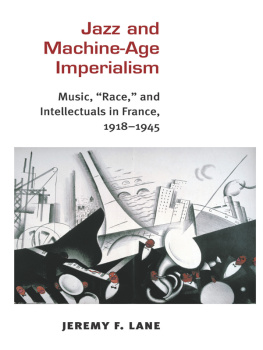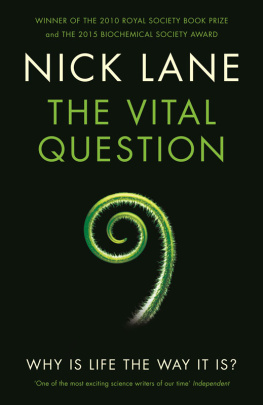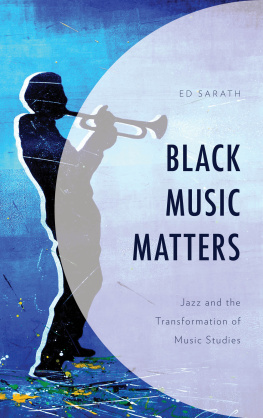Lane - Jazz and machine-age imperialism music, race, and intellectuals in France, 1918-1945
Here you can read online Lane - Jazz and machine-age imperialism music, race, and intellectuals in France, 1918-1945 full text of the book (entire story) in english for free. Download pdf and epub, get meaning, cover and reviews about this ebook. City: Ann Arbor;France, year: 2013, publisher: University of Michigan Press, genre: Romance novel. Description of the work, (preface) as well as reviews are available. Best literature library LitArk.com created for fans of good reading and offers a wide selection of genres:
Romance novel
Science fiction
Adventure
Detective
Science
History
Home and family
Prose
Art
Politics
Computer
Non-fiction
Religion
Business
Children
Humor
Choose a favorite category and find really read worthwhile books. Enjoy immersion in the world of imagination, feel the emotions of the characters or learn something new for yourself, make an fascinating discovery.
- Book:Jazz and machine-age imperialism music, race, and intellectuals in France, 1918-1945
- Author:
- Publisher:University of Michigan Press
- Genre:
- Year:2013
- City:Ann Arbor;France
- Rating:5 / 5
- Favourites:Add to favourites
- Your mark:
- 100
- 1
- 2
- 3
- 4
- 5
Jazz and machine-age imperialism music, race, and intellectuals in France, 1918-1945: summary, description and annotation
We offer to read an annotation, description, summary or preface (depends on what the author of the book "Jazz and machine-age imperialism music, race, and intellectuals in France, 1918-1945" wrote himself). If you haven't found the necessary information about the book — write in the comments, we will try to find it.
Jazz and machine-age imperialism music, race, and intellectuals in France, 1918-1945 — read online for free the complete book (whole text) full work
Below is the text of the book, divided by pages. System saving the place of the last page read, allows you to conveniently read the book "Jazz and machine-age imperialism music, race, and intellectuals in France, 1918-1945" online for free, without having to search again every time where you left off. Put a bookmark, and you can go to the page where you finished reading at any time.
Font size:
Interval:
Bookmark:

JAZZ PERSPECTIVES
Eric Porter and John Szwed, Series Editors
Lewis Porter, Founding Editor
Open the Door: The Life and Music of Betty Carter
By William R. Bauer
Jazz Journeys to Japan: The Heart Within
By William Minor
Four Jazz Lives
By A. B. Spellman
Head Hunters: The Making of Jazz's First Platinum Album
By Steven E Pond
Lester Young
By Lewis Porter
The Last Miles: The Music of Miles Davis, 19801991
By George Cole
The Andr Hodeir Jazz Reader
By Andr Hodeir
Edited By Jean-Louis Pautrot
Someone to Watch Over Me: The Life and Music of Ben Webster
By Frank Bchmann-Mller
Rhythm Is Our Business: Jimmie Lunceford and the Harlem Express
By Eddy Determeyer
Lennie Tristano: His Life in Music
By Eunmi Shim
Lee Konitz: Conversations on the Improviser's Art
By Andy Hamilton
Delightfulee: The Life and Music of Lee Morgan
By Jeffery S. McMillan
Ellington Uptown: Duke Ellington, James P. Johnson, and the Birth of Concert Jazz
By John Howland
New Orleans Style and the Writing of American Jazz History
By Bruce Boyd Raeburn
The Music of Django Reinhardt
By Benjamin Givan
Music Is My Life: Louis Armstrong, Autobiography, and American Jazz
By Daniel Stein
Dameronia: The Life and Music of Tadd Dameron
By Paul Combs
Jazz and Machine-Age Imperialism: Music, Race, and Intellectuals in France, 19181945
By Jeremy F. Lane
Copyright by the University of Michigan 2013
All rights reserved
This book may not be reproduced, in whole or in part, including illustrations, in any form (beyond that copying permitted by Sections 107 and 108 of the U.S. Copyright Law and except by reviewers for the public press), without written permission from the publisher.
Published in the United States of America by
The University of Michigan Press
Manufactured in the United States of America Printed on acid-free paper
Printed on acid-free paper
2016 2015 2014 2013 4 3 2 1
A CIP catalog record for this book is available from the British Library.
Library of Congress Cataloging-in-Publication Data
Lane, Jeremy F.
Jazz and machine-age imperialism : music, race, and intellectuals in France, 1918-1945 / Jeremy F. Lane.
pages cm. (Jazz perspectives)
Includes bibliographical references and index.
ISBN 978-0-472-11881-6 (cloth : alk. paper) ISBN 978-0-472-02922-8 (e-book)
1. JazzFranceHistory and criticism. 2. Music and raceFranceHistory20th century. 3. World War, 19391945Music and the war. I. Title.
ML3509.F7L36 2013
781.65094409041dc22 2012047395
What special analytical problems arise if a style, genre, or particular performance of music is identified as being expressive of the absolute essence of the group that produced it? What contradictions appear in the transmission and adaptation of this cultural expression by other diaspora populations, and how will they be resolved? How does the hemispheric displacement and global dissemination of black music get reflected in localised traditions of critical writing, andwhat value is placed on its origins, particularly if they come into opposition against further mutations produced during its contingent loops and fractal trajectories?
Paul Gilroy, The Black Atlantic (1993)
In writing this book, I have been helped by numerous friends and colleagues who have offered invaluable amounts of advice, encouragement, and constructive criticism along the way. It was Chris Bongie who first persuaded me that a book on jazz would be more interesting than a study of the then still relatively unknown French intellectual Jacques Rancire. He subsequently took the time to read a very early draft Introduction, itemizing its numerous failings with patient insistence and a refreshing honesty, sending me back to the drawing board to, I hope, salutary effect. I also owe a huge debt of gratitude to both Martin Munro and Celia Britton who, having pointed me in the direction of those French intellectuals of color who had an interest in jazz, went on to read early versions of my work, offering detailed comments, advice, and encouragement in equal measure. Bill Marshall has proved a longtime supporter of the project, inviting me to a number of conferences over the years to present my ideas. He and Richard Watts generously acted as tour guides on my first visit to the city of New Orleans. Philip Swanson and Jon Beasley-Murray have provided much-needed support along the way, in the form of friendship, intellectual sustenance, and entertainment. I should also like to thank Chris Hebert, at the University of Michigan Press, for his support and work in piloting the project through various stages of the editorial and production process. Finally, the two anonymous reviewers of my manuscript provided a range of detailed and extremely helpful comments and suggestions, for which I am deeply grateful.
Early and significantly different versions of sections of this book have previously appeared as Rythme de Travail, Rythme de Jazz: Jazz, Primitivism and Machinisme in Inter-war France, Atlantic Studies 4, no. 1 (April 2007): 10316, and Jazz as Habitus: Discourses of Class and Ethnicity in Hugues Panassi's Le Jazz Hot (1934), Nottingham French Studies 44, no. 3 (2005): 4053. I am grateful to the editors of both journals for allowing me to reproduce elements of those articles here. I am also grateful to the University of Virginia Press for permission to reproduce selected quotations from Lopold Sdar Senghor, The Collected Poetry (Charlottesville: University of Virginia Press, 1991), and to Prsence africaine for permission to reproduce extracts from Lon-Gontran Damas, Pigments-Nvralgie (Paris: Prsence africaine, 1972).
In the 1920s, the French commentator Georges Duhamel toured the United States, examining the state of a society that, particularly in light of the American role in the First World War, seemed to French eyes to represent the height of industrial and technological development, of efficiency and ingenuity, while embodying the most modern of social and sexual mores. Horrified and fascinated in equal measure by what he had observed, Duhamel published his findings in his 1930 America the Menace: Scenes from the Life of the Future, a book that rapidly became a best seller in his native France. One of the book's many set pieces is Duhamel's account of his visit to the Chicago stockyards. The decision to tour the Chicago stockyards was no coincidence, given that at the time they were the workplace in which the principles of Taylorist scientific management and Fordist mechanization had been most systematically applied anywhere in the world. The fact that this involved Duhamel describing a scene of mechanized slaughter allowed him to lay it on thick, revelling in the hellish portrait he painted of the future that awaited French society if it continued to embrace the practices of machinisme, of a machine age he took to have originated in and to be epitomized by the United States.
Thus Duhamel structured his account of the Chicago stockyards, chillingly entitled The Kingdom of Death, in accordance with the recognizable literary trope of the journey to the Underworld. One of the archetypes of that trope, the Orpheus myth, devotes, of course, a very special place to music, so we should not be surprised that Duhamel too should have imagined a strange music emanating from this scene of gory but rationally ordered slaughter. Having evoked the blood and gore that spurted from a seemingly unending conveyor belt of pigs, Duhamel remarked on the terrible squeals and cries given off by the dying animals as a series of anonymous workers set about their slaughter, evisceration, and butchery with metronomic regularity. Surely a people as enterprising and efficient as the Americans, he speculated, could not let all that sound energy go to waste, surely some practical use could be found for it? Yes, he concluded, one day soon it would be transformed into jazz.
Font size:
Interval:
Bookmark:
Similar books «Jazz and machine-age imperialism music, race, and intellectuals in France, 1918-1945»
Look at similar books to Jazz and machine-age imperialism music, race, and intellectuals in France, 1918-1945. We have selected literature similar in name and meaning in the hope of providing readers with more options to find new, interesting, not yet read works.
Discussion, reviews of the book Jazz and machine-age imperialism music, race, and intellectuals in France, 1918-1945 and just readers' own opinions. Leave your comments, write what you think about the work, its meaning or the main characters. Specify what exactly you liked and what you didn't like, and why you think so.


















